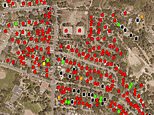The number of people going to the emergency room from a marijuana-induced illness has doubled since 2017, according to new research.
The condition, called cannabinoid hyperemesis syndrome (CHS), sends affected individuals to the hospital with a seemingly endless cycle of vomiting, nausea and abdominal pain that can last for a week and become life threatening due to extreme dehydration, seizures and kidney failure.
At home, people can often only find relief in a hot shower or bath, but in the hospital, anti-nausea drugs and IV- fluids can help treat the nausea, vomiting and dehydration.
In June, a case study told the story of an anonymous 22-year-old Canadian woman, who after eight years of regular cannabis use, died from heart problems her doctors blamed on CHS.
She had been to the doctor six times in the months before she passed away, with nausea and vomiting that had lasted for a week at a time. At the time of her death, she was severely dehydrated and low in nutrients that regulated her heart's rhythm.
Dr Maria Isabel Angulo, from the University of Illinois, published the report, saying CHS now affects an estimated 2.75million Americans each year, and the syndrome has increased the most in men between ages 16 and 34.
She said two factors are contributing to this rise: marijuana has become more potent and more widely available as legalization of the drug spreads across the US.

In recent decades, marijuana has become more potent as more THC, the active ingredient in the drug, gets added to the plant as new generations are cultivated.
According to Yale School of Medicine, in 1995, the average THC content in cannabis was about four percent.
By 2017, the amount had risen more than four-fold, making the average THC content in cannabis about 17 percent.
Today, on average, the amount of THC in the product has increased by 18 to 35 percent, according to National Geographic.
Dr Deepak Cyril D'Souza, a psychiatrist at Yale University School of Medicine told National Geographic: 'The cannabis that’s available now is much more potent than what was available 30 years ago.'
It doesn't appear that CHS is caused by marijuana that is laced with other substances, instead, the main factor seems to be how frequently people are consuming THC and how much THC they are consuming.
Dr Angulo's review compiled earlier research from the Department of Medicine at the University of Calgary that used surveys of CHS patients and hospital data from Alberta to estimate the amount of people visiting the ER with the condition in North America.
It's difficult to say for certain how many people use marijuana, but the National Center for Drug Abuse puts the number at about 55million - which would make this condition affect about five percent of weed users.
People most at risk for the condition are those who have been using the drug every day for a year. It's also more common in people who began using the drug before 16.
Scientists have yet to figure out what causes someone to develop such an extreme reaction to marijuana.

Their leading theory, according to the Cleveland Clinic, is that using the drug frequently causes changes to a part of your body called the endocannabinoid system.
This is a network of chemicals and proteins in the brain and gut that control your pain response, brain development, appetite, stress response and GI movement.
THC is one of many chemicals that can latch onto and cause changes in this system. Over time, constant stimulation of the network might cause it to be thrown out of balance, leading your body to extreme, cyclical vomiting.
Doctors diagnose someone with CHS if they've had three or more episodes of cyclical vomiting, smoke marijuana for more than four days a week and whose symptoms disappear after six months of quitting smoking.
At home, it can be difficult for patients to overcome this illness - since stopping marijuana suddenly can lead to withdrawal that makes the condition worse.
In the hospital, doctors treat the illness by giving a patient anti-nausea drugs and intravenous fluids to rehydrate them and get their balance of crucial nutrients back up.
In some cases, patients also require anti-psychotic drugs because their excessive marijuana use has driven them to psychosis. This can include hallucinations, extreme paranoia and delusions.
After recuperating in the hospital, doctors may send patients home with antidepressant drugs, and advise they cease using marijuana all together, Dr Angulo said.












